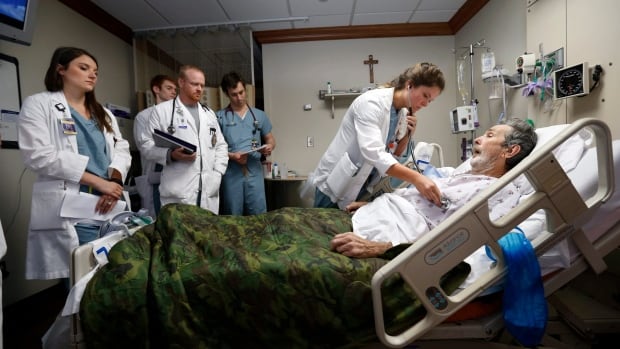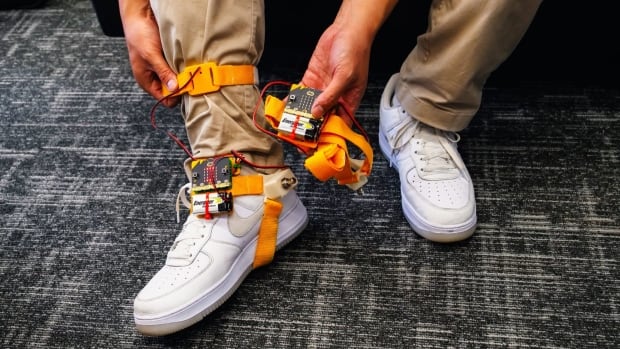Dalhousie University has pulled all medical students and post-graduate trainees from any cardiac training at the Saint John Regional Hospital and New Brunswick Heart Centre after some complained about alleged harassment and the learning environment, CBC News has learned.
Students and trainees were notified nearly seven months ago of the “pause” to “address issues.”
“As of Nov. 10th at 5 pm, placement of learners on [the cardiac care unit] and other cardiology related clinical teaching experiences in Saint John will be stopped,” an internal memo, obtained by CBC News, said.
“Learner feedback has highlighted concerns … about behaviours in the environment consistent with intimidation/harassment/racism/sexism,” as well as the level of supervision of learners, especially on call, it said.
No information about the number of complainants, or the accused has been released.
“We were notified that essentially Dalhousie was removing all of its learners — so that would be undergraduate medical students,” completing the third and fourth years of their medical degree, confirmed Ben Peterson, president of the Dalhousie Medical Students’ Society, a group which represents about 550 undergraduates between the Saint John and Halifax sites. Also included were graduates completing their specialized training, known as residents.
When something comes across your email and it says, you know, ‘Effective immediately, students are not to be in the space,’ I think that the gravity and the seriousness comes across.– Ben Peterson, Dalhousie Medical Students’ Society president
“And we were made aware at that time that it was due to an investigation into some essentially … alleged harassment towards learners,” he said.
“I don’t know the details but I think for me, when something comes across your email and it says, you know, ‘Effective immediately, students are not to be in the space,’ I think that the gravity and the seriousness comes across.”
Environment can be ‘harsh’
Medical resident Mario Jones, who will be starting his first year of training in internal medicine in Saint John, with his first planned cardiology rotation in about four to six months, agrees the medical students and residents weren’t given “a whole lot of information” about the allegations.
Jones, 31, of Blacks Harbour, previously trained as a nurse and spent two or three months at the New Brunswick Heart Centre.
Mario Jones says Dalhousie University notified undergraduates and residents in November it was pulling them from cardiology-related clinical training at the Saint John Regional Hospital and the New Brunswick Heart Centre to investigate alleged harassment reported by some students.
While his experience was a positive one, “To say that the environment can be difficult at times, maybe even harsh, I don’t think that’s going too far,” he said.
“But I think that the staff and, you know, the physicians are very much interested in making that a more welcoming environment and having the learners back as soon as possible.”
Takes allegations seriously
Dalhousie officials declined an interview. Instead, Jason Bremner, spokesperson for the university’s faculty of medicine, emailed a statement.
“Dalhousie Medicine New Brunswick takes all allegations of harassment seriously,” he said, but “can’t comment on specific allegations due to privacy considerations.”

Last year, the university launched an office of professional affairs to investigate complaints of mistreatment from students and residents. Incidents can be reported anonymously through an online portal.
Horizon Health Network officials also declined an interview. In an emailed statement, Dr. Susan Brien, senior vice-president, medical, academic and research affairs, said Horizon “takes seriously any allegations of workplace harassment,” but declined further comment, referring to the situation as “an internal matter.”
Status of investigation unclear
Neither Bremner nor Brien responded to questions about the status of the investigation or any disciplinary action.
Dr. Jean-François Légaré, interim medical director and clinical head of cardiac surgery for the New Brunswick Heart Centre, did not agree to an interview but told CBC he is “unaware of any formal investigation into harassment.” He did not respond to a request for clarification of what he meant by “formal.”

“As for the decision from Dalhousie they are likely in a better position to answer your [questions],” Légaré said in an emailed statement.
“Our focus at the New Brunswick Heart Centre remains patient care and more importantly has not been impacted by Dalhousie’s decision,” he said, without responding to further questions.
Dr. Laurie Potter, registrar of the New Brunswick College of Physicians and Surgeons, the regulatory body for province’s doctors, did not respond to requests for comment.
The advocacy group for medical residents, Maritime Resident Doctors, declined to comment. “We don’t have anything to add to this story at this time,” said spokesperson Daniel Bonner.
Students surprised by removal
Peterson, who just completed his second year of study and has not yet begun his clinical years, said there are roughly 20 Dalhousie students rotating through various departments at the Saint John Regional Hospital at any given time.
The students typically spend 10 to 12 weeks in each department, such as internal medicine, which includes the cardiac care unit, and surgery, which includes the New Brunswick Heart Centre, the province’s only tertiary cardiac care centre.
When Dalhousie notified the medical students and residents it was halting the cardiac rotations in Saint John, “there was some surprise,” said Peterson.
“I don’t think students ever expected to be, you know, taken out of the learning environment.”

It hasn’t been easy for students, said Peterson. The transition from classroom-centred learning to workplace-centred learning is often already a difficult one for many, he said.
“To have all of those extra layers added on around maybe a workplace that doesn’t always function as it’s intended to, I think it is stressful for a lot of students.”
Knowing that the university is taking the allegations seriously helps, said Peterson.
‘Crown jewel’ of training program
Jones said it’s a big loss to the province’s teaching program. The New Brunswick Heart Centre is widely regarded as the “crown jewel” and the reason many students choose to study here, he said.

It has “all kinds of patients that have many different conditions with their hearts going on.” It’s also one of the very few places in the country that does cardiac catheterizations and cardiac surgery.
“Most places that do these two procedures and all the things that go along with it are a whole lot larger than Saint John. And so we’re really fortunate to have this sort of thing.”
Students given other options
Dalhousie has given students the option to do a cardiac rotation at another site, such as the Moncton Hospital, or to spend that period with another specialty, said Peterson.
The university has also provided the medical students’ society with some brief updates and he’s satisfied with the progress so far, he said.
“Our mandate is to make sure that students get the teaching that they need, that they get that teaching in a safe learning environment where they are respected and they are able to learn.
“So when the university, you know, comes to us and says, ‘Here are contingency plans that we’ve put in place to make sure that we meet those outcomes,’ that’s sort of where our box is ticked.”

Jones is also confident students will get the training they need, but remains hopeful his Saint John cardiac rotation will proceed as scheduled.
“There’s a lot of really great doctors there that have been teaching for quite a long time and have taught a lot of the doctors New Brunswick has now. … And you know that they see the value in teaching,” he said.
“It’s not so long ago that these same folks were in my shoes, you know, starting off their training programs. So I’m sure that we’ll get back to business in a respectful manner sooner than later.”







